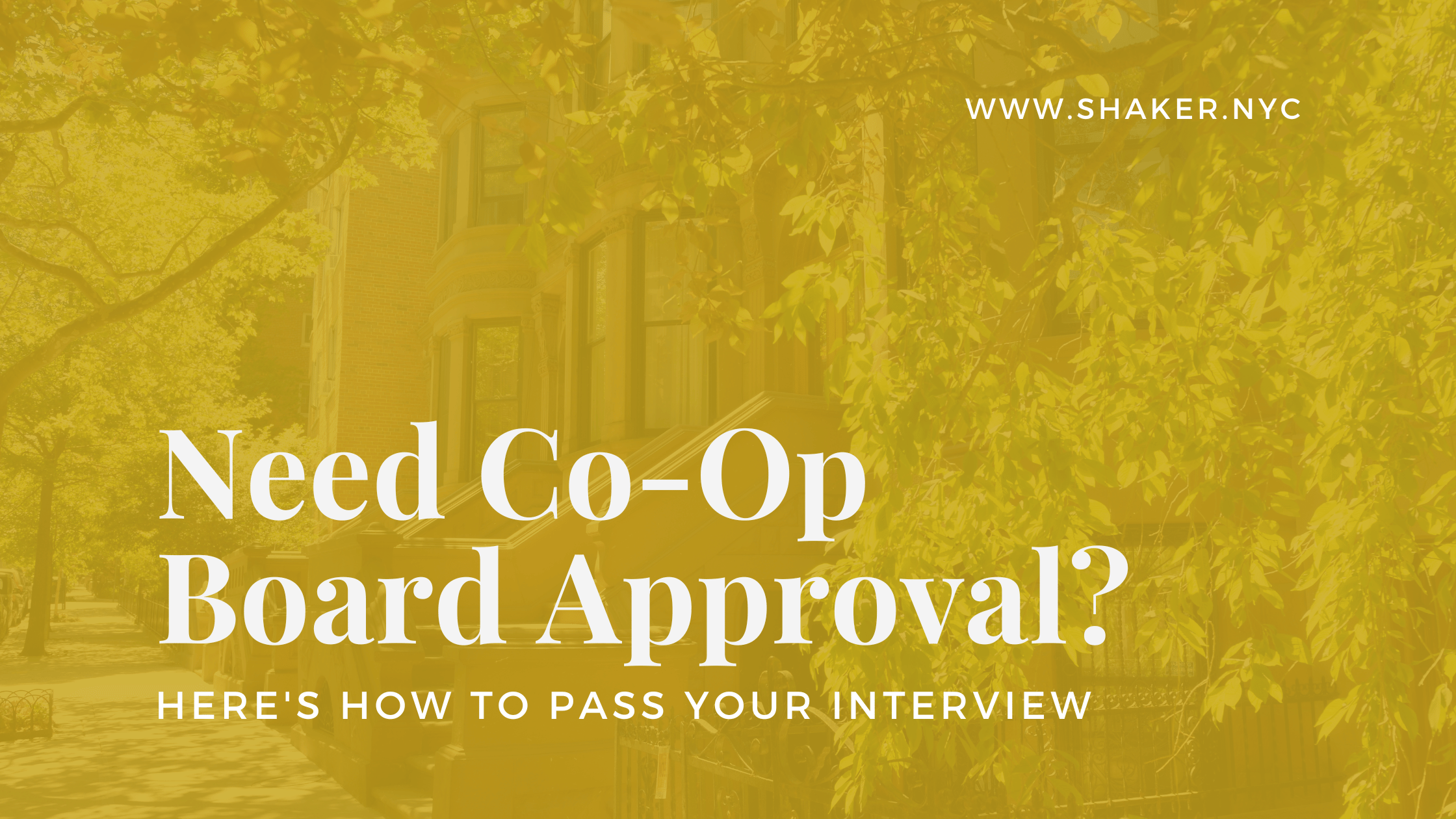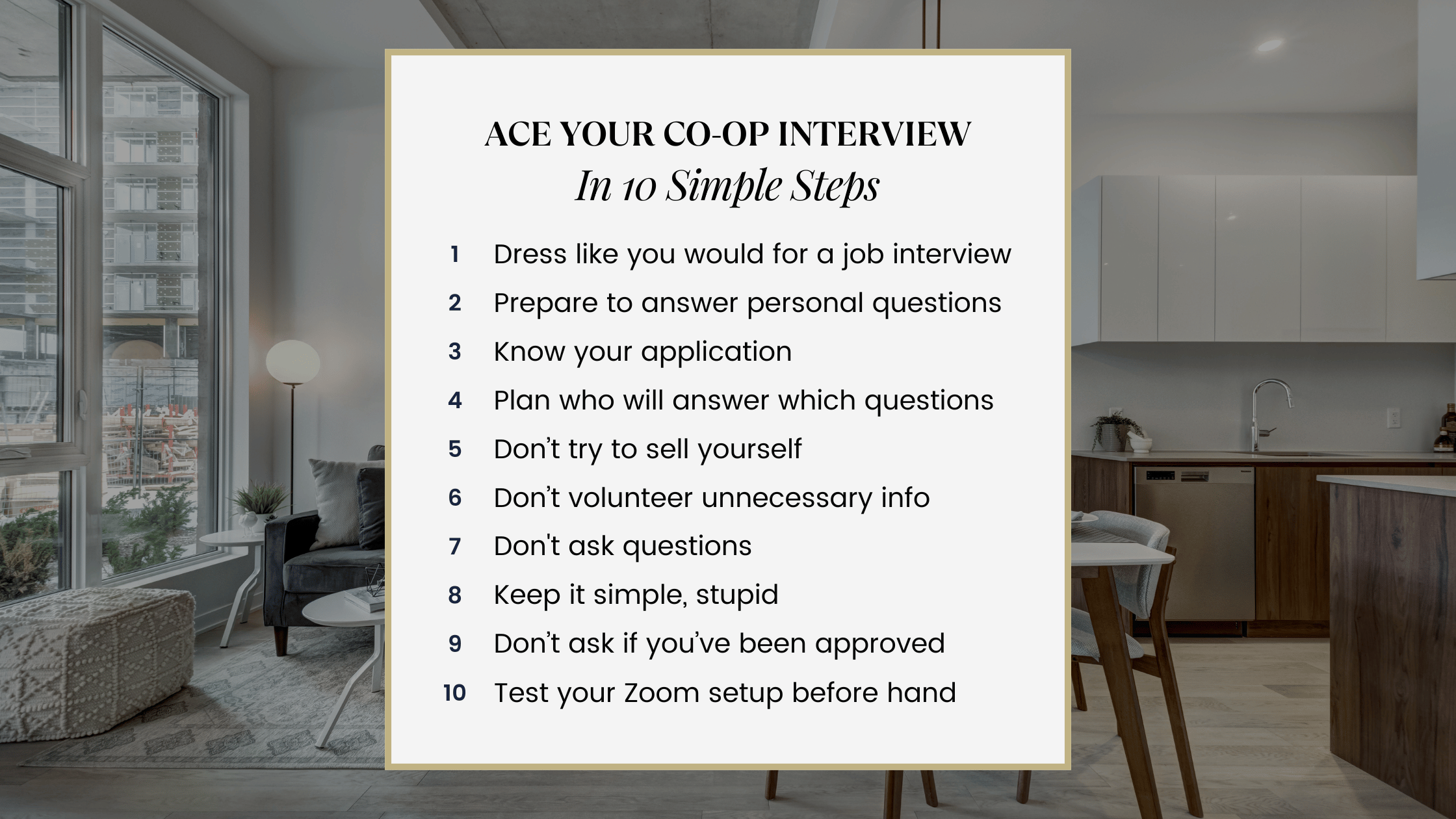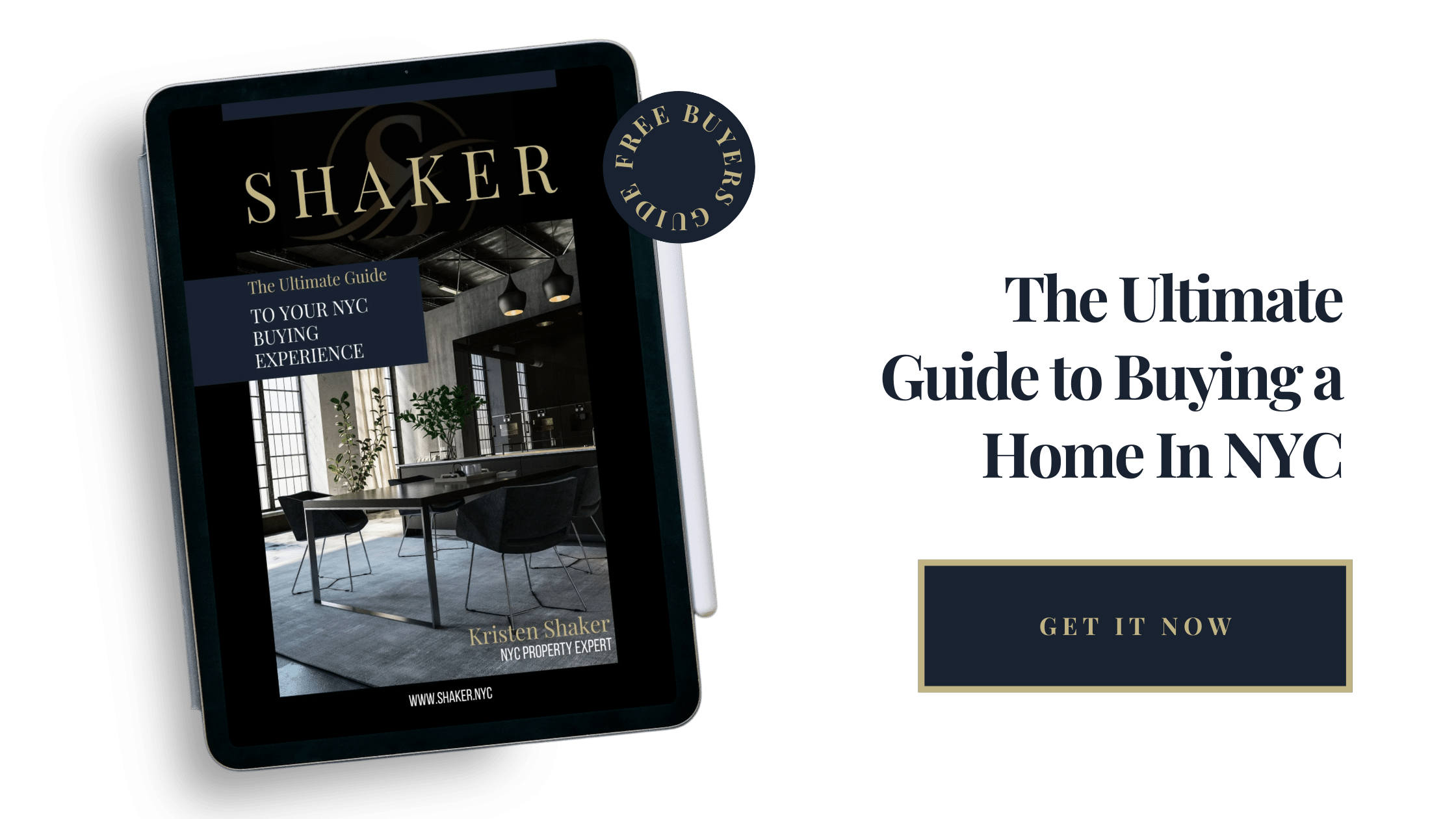Need Co-Op Board Approval? Here's How to Pass Your Interview
Co-op board interviews can be intimidating, considering boards can reject any candidate for almost any reason. Passing the board interview is the final step in your co-op approval process, which means if you’re here you’re close to the finish line. But this step in the process is not a formality. Board rejections happen every day. Make sure you don’t waste months of your time and stumble right as you’re coming up to the finish line by following these 10 ridiculously simple tips.
Some Definitions before we get started:
Co-op: A co-op apartment, short for cooperative apartment, is a type of housing where you don't actually own your individual unit. Instead, you own shares in a cooperative corporation that owns the entire building. These shares give you the right to live in a specific apartment. You also have a say in how the building is run, because all shareholders typically get to vote on important decisions.
Co-Op Board: A co-op board is a group of residents who are elected by the shareholders of a cooperative apartment building to manage and oversee the building's operations. They make important decisions about the building, such as approving new residents, setting maintenance fees, and enforcing rules. The co-op board ensures the building is run smoothly and in the best interest of all residents.
Why Your Interview Matters
Your board interview is one of the final steps in your process before approval, and the last thing you have to do as a buyer before getting the keys. However, that doesn’t mean you’re at the finish line just yet; boards are notorious for rejecting candidates, even for the smallest of reasons. I know of someone who was rejected from a co-op for being just two minutes late to their interview.
Which is why I train my clients with Pre-Board Interview Training.Co-op interviews can be scary, but if you’re well prepared the interview will be easy to ace.
Need help buying your home? Download my FREE Home Buyer’s Guide. >>>
10 Steps to Passing Your Co-Op Board Interview
1. Dress Like You Would for A Job Interview
First impressions matter. Wear professional clothing. Show the board that you take this part of the process seriously. If you’re dressed sloppily, you’re telling the board you don’t care about their time or their process.
Here are some guidelines to follow:
Business Attire: Aim for business casual attire, such as a button down, a blazer, tailored dress, skirt.
Clean and Neat: Ensure your clothes are clean, ironed, pressed, and in good condition.
Comfortable Shoes: Wear clean, polished, and comfortable shoes, like dress shoes or flats.
Grooming: Pay attention to personal grooming, such as clean and styled hair, and if applicable, neatly trimmed facial hair.
Neutral Colors: You don’t want to stand out for the wrong reasons. Choose neutral colors like black, navy, gray, or beige, which are generally seen as professional and conservative.
Minimal Accessories: Keep accessories and jewelry minimal and understated.
Dressing professionally shows respect for the interview process and indicates that you take the opportunity seriously. It also allows your personality to shine through.
2. Prepare To Answer Personal Questions
Don’t be upset if the board asks you something you believe to be too personal. The board has a huge amount of latitude when it comes to asking you questions. Try to answer the question politely and briefly without getting touchy.
Here are some examples of co-op board questions:
Do you have any pets? If so, what kind and how many?
Do you plan to have any long-term guests or roommates?
How do you typically spend your weekends or free time?
What are your hobbies?
Why did you choose this co-op and neighborhood?
Are you worried about losing your job?
How do you feel about participating in community events or meetings?
Can you describe your previous experiences living in a community setting?
How long do you plan to stay in this apartment if approved?
How do you keep your living space clean and organized?
These questions help the co-op board assess whether you will be a responsible and cooperative resident who fits well with the existing community.
3. Know your application.
Know what is in your application. You might get asked about it. Feel free to have a copy on hand. Here is a brief list of information you will want to brush up on:
Financial Information:
Know the details of your income, assets, and liabilities.
Be prepared to explain any significant financial transactions or anomalies.
Understand your debt-to-income ratio and how you plan to handle the monthly maintenance fees.
Employment Details:
Such as your job title, employer, length of employment, and salary.
Personal and Background Information:
Be familiar with your residential history, including addresses, landlords, and the duration of your stay at each place.
Know your credit history and be prepared to explain any issues or discrepancies if asked.
References:
Remember who your references are, their contact information, and their relationship to you.
Ensure that your references are aware they might be contacted by the co-op board.
Intentions and Plans:
Know why you chose this particular co-op and what you like about the community.
Have a clear idea of your future plans regarding the apartment.
Lifestyle and Community Fit:
Know your answers to any lifestyle questions you might have addressed in the application, such as pet ownership, hobbies, or community involvement.
Know how you plan to integrate into the community and contribute positively.
By being well-versed in your application, you can confidently answer questions and demonstrate that you are a responsible, well-prepared, and suitable candidate for the co-op.
Prep yourself to flawlessly answer tough co-op questions here >>>
4. Plan Who Will Answer Which Questions
If you are Co purchasing or renting an apartment with a spouse, partner or friend, make sure you figure out who will be answering which types of questions in advance. For example, one of you may handle the financial questions while another one of you might answer questions about your personal hobbies.
5. Don’t try to sell yourself
Your board package should have already done that for you. We want you to look confident and not arrogant.
Remember that the board is running the show. The board is looking for genuine and honest responses. Overselling yourself can come across as insincere or desperate, which may raise doubts about your true character and intentions. They’re also looking for residents who will be a good fit with the existing community. Being overly promotional can make you seem more focused on getting the apartment than on being a cooperative and compatible member of the community.
They’re in charge and it’s in your best interest to act that way. Be humble, gracious, and authentic.
6. Don’t Volunteer Unnecessary Information
Yes or No answers are totally acceptable. Don’t provide any information you are not explicitly asked for. Think of this like a cross examination. Providing only relevant information helps keep the interview focused and concise. Likewise, sharing too much information can inadvertently expose you to unnecessary scrutiny or judgment. And extra information can lead to misinterpretation or raise concerns that were not previously considered. This might create issues where none existed. It's best to stick to what is directly related to your application and suitability as a co-op resident.
Be friendly and polite but do not elaborate.
7. Don’t Ask Questions
Any question is an opportunity to potentially offend someone. You never know to what degree the interviewing board members are involved in any building projects, or what their opinions are about the building. So if, for example, you ask if there are any upcoming capital improvements, you might offend someone on the board who thinks the building is beautiful as it is.
8. Keep it simple, stupid (Kiss)
Don’t overthink it. If you can keep the interview short and simple, do so. Don’t try to fill empty air time just because the meeting might have been scheduled for a longer block.
9. Don’t Ask If You’ve Been Approved in the Meeting
Do not ask the board what they thought of you or if you’ve been approved. Here’s how you should end the meeting instead:
Express Gratitude: Thank the board members for their time and the opportunity to interview. A simple, sincere thank you goes a long way.
"Thank you for taking the time to meet with me and consider my application."
Be Polite and Professional: Stand up, shake hands (if appropriate), and maintain a friendly demeanor as you exit.
"Thank you again for your time. Have a great day!"
By following these steps, you can leave the meeting on a positive note while maintaining a professional demeanor.
10. Test Your Zoom Setup Before Hand
Board interviews are by and large conducted virtually. Spend some time before the meeting to make sure your system works with whatever video conferencing software the board is using.
Here’s a checklist of everything you should go through to prepare:
Prepare Materials:
Have any necessary documents, notes, or your co-op application nearby for easy reference.
Keep a pen and paper handy for taking notes.
Test Your Equipment:
Camera: Ensure your camera is working and provides a clear, well-lit image. Position it at eye level for a natural look.
Microphone: Test your microphone to make sure your voice is clear and at a good volume. Use a headset or external microphone if necessary.
Internet Connection: Check your internet speed and stability. Use a wired connection if possible to reduce the risk of disconnection.
Lighting:
Ensure you have good lighting, preferably natural light from a window in front of you. Board interviews typically occur at night, so consider having a lighting source (like a ring light) handy.
Location:
Choose a clean, uncluttered background. A plain wall or a tidy, professional-looking room is ideal. Avoid virtual backgrounds that can be distracting.
Choose a quiet location where you won't be interrupted. Inform others in your household about the interview to minimize noise. (You can also mute notifications on your computer and phone to avoid distractions.)
Technical Backup Plan:
Have a backup plan in case of technical issues, such as a phone to call from if the video connection from the computer fails.
Timing and Punctuality:
Log in to the Zoom meeting five minutes early to ensure everything is set up correctly and to show punctuality.
By testing and optimizing your setup with these steps, you can ensure a professional and smooth Zoom interview experience.
FAQ About Co-Op Boards
What does co-op stand for?
short for cooperative apartment, is a type of housing where you don't actually own your individual unit. Instead, you own shares in a cooperative corporation that owns the entire building. Non-coop buildings in New York are called condominiums, or condos.
What does co-op board mean?
A co-op board, short for cooperative board, is a group of individuals elected by the shareholders of a cooperative housing corporation (co-op). The co-op board is responsible for managing the co-op's operations and making important decisions on behalf of the shareholders.
What do NYC Coop boards look for?
Co-op boards typically look for several key qualities and factors when evaluating potential new residents:
Financial Stability: Co-op boards want assurance that applicants have a stable financial situation and can afford the costs associated with co-op living, including monthly maintenance fees and any assessments. They often look at income, savings, debt-to-income ratio, credit history, and employment stability.
Compatibility with Community: Boards seek applicants who will fit well within the existing community and uphold the co-op’s values and rules. This includes assessing lifestyle factors such as noise tolerance, pet ownership, and involvement in community activities.
Responsible Ownership: They look for applicants who demonstrate responsibility and reliability in property ownership, including a track record of maintaining previous residences and adhering to co-op regulations.
Long-Term Commitment: Boards prefer applicants who are likely to stay in the co-op for an extended period, promoting stability within the community and reducing turnover.
Good Communication Skills: Effective communication is valued, as it indicates an ability to participate constructively in board meetings and community discussions.
References and Recommendations: Positive references from previous landlords or community associations can bolster an applicant’s credibility and reliability.
Professionalism and Preparedness: Boards appreciate applicants who approach the interview process professionally, are well-prepared, and show genuine interest in becoming part of the co-op community.
Respect for Rules and Regulations: Demonstrating an understanding of and willingness to abide by the co-op’s rules and regulations is essential.
How often do co-op boards reject?
Boards reject applicants about 3-5% of the time. This may sound like a small percentage, but it’s actually a huge number of people considering how many people in New York apply for co-ops each year.
How to pass a co-op board interview?
To pass a co-op board interview, it is essential to prepare thoroughly by understanding and articulating your financial stability, lifestyle compatibility with the community, and long-term commitment to the cooperative. As you are asked, present a clear and honest portrayal of your financial situation, including income, savings, and any debts, while demonstrating a steady employment history and ability to afford maintenance fees. Emphasize your respect for the co-op's rules and regulations, showcase your readiness to participate actively in community activities, and highlight any positive references or recommendations. Maintain professionalism, listen attentively, and respond directly to questions without elaborating, showcasing your enthusiasm for becoming a responsible and cooperative member of the co-op community.
How do you impress a coop board?
To impress a co-op board, focus on presenting yourself as a responsible, financially stable, and community-minded candidate. Demonstrate thorough preparation by understanding the co-op's values, rules, and financial requirements, and be able to articulate how your lifestyle aligns with these as you are asked. Maintain professionalism throughout the interview, listen actively to board members' questions and concerns, and show genuine enthusiasm for becoming an integral part of the co-op community.
How to dress for a coop board interview?
For a co-op board interview, dressing in business casual attire is appropriate and professional. Opt for neat, well-fitting clothing that conveys respect for the occasion while still being comfortable and approachable. Men can wear slacks or khakis paired with a collared shirt (such as a button-down shirt or a polo shirt) and dress shoes. Women can choose dress pants or a skirt with a blouse or a conservative top, complemented by flats or low heels. Avoid overly casual attire like jeans, t-shirts, or sneakers, and opt for neutral colors or subtle patterns. The goal is to present a polished appearance that shows you take the interview seriously and are ready to engage with the board in a professional manner.
More Resources
Whether you're navigating the exciting journey of buying a new home or exploring cooperative living options, having the right guidance is crucial. Downloading our comprehensive and free Homebuyer's Guide can provide you with valuable insights and tips to find and get approved for the home of your dreams.
And if you have specific questions about co-op living or are ready to take the next step and find a real estate agent, reach out to us today. My name is Kristen Shaker, and I’m here help you navigate every step of the process and ensure you find the perfect place to call home.
Happy house hunting!










